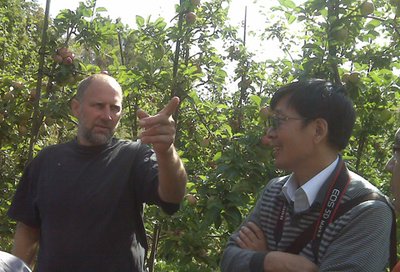Workshop 2
Chinese-Danish networking on Systemic Approaches to Pest Management without Pesticides
Workshop 2: 22-24 August, 2012 Denmark
ICROFS, Aarhus University and University of Copenhagen jointly organised the 2nd workshop of the international network project on ‘Systemic Approaches to Pest Management without Pesticides’ where researchers form partner universities in China, China Agricultural University, Southern China Agricultural University and Zhejiang University, visited Denmark to continue the work that was commenced at the first project workshop held in April in China.
The workshop included visits to ICROFS, Research Centre Foulum and Research Centre Flakkebjerg of Aarhus University, and Frederiksberg Campus of the University of Copenhagen.
Background for the workshop:
Minimization of the use of pesticides in organic as well as in conventional agriculture is a priority in Denmark and in China for food safety, environmental protection and economic reasons. There is an increasing demand for organic products in both countries; however, conversion to pesticide free management of the agricultural land at a larger scale requires research on systemic and integrated approaches to pest management at field and landscape level.
At the first project workshop held in China a group of Danish and Chinese researchers met to exchange knowledge on pest management without pesticides, and to identify and discuss joint research priorities and key challenges in developing systemic approaches to pest management.
It was agreed at the first workshop that in spite of many differences relating mainly to farming systems and their management, there were also many common research interests and priorities and a high potential for collaboration in developing systemic approaches to pest management without pesticides.
It was agreed that collaboration would be beneficial for both countries. It was also agreed that high value crops such as fruit, berries and vegetables would be of immediate priority for collaboration on developing systemic approaches.
At the first workshop it also became clear that integration of management practices of pests in the field as well as up-scaling to farm/systems level and landscape level was of priority for both countries and therefore that the framework of systemic approaches was the right common denominator for future collaboration between research in pest management in Denmark and in China.
Reaching the objectives and outputs of the workshop
The objectives of the workshop was to establish a joint framework for collaboration for development of systemic approaches to pest management without pesticides with recommendations for topics suitable for collaborative research.
At the conclusion of the workshop participants agreed that after 3 intensive workingdays the expected outputs of the workhop had been achieved, namely that:
- All workshop participants have a good understanding of the organic farming systems in Denmark and China and a better foundation for the discussions on the selected themes (systemic approaches to pest management in vegetables, and systemic approaches to pest management in fruit and berries);
- Agreements on draft strategy and recommendations for research collaboration between China and Denmark for the selected themes.
- Agreements on draft strategy and recommendations for research collaboration between China and Denmark within the selcted themes.
Based on the outcome of the workshop, the core group of Chinese and Danish researchers in the network have prepared a report with recommendations for future collaboration. The report was published 1 December 2012.
